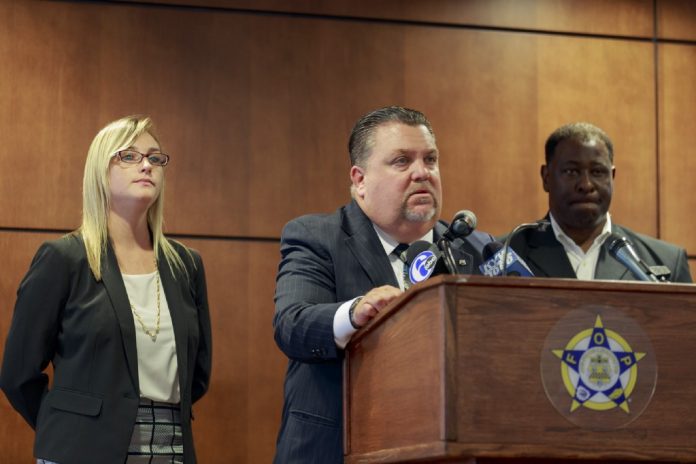Protecting the police: State Rep. Martina White (left) and FOP Lodge 5 President John McNesby (center) announced legislation on Sept. 2 that would prohibit public officials from revealing the identities of police officers involved in on-duty shootings. SOURCE: FOP LODGE 5
Revenge may be a dish best served cold, but state Rep. Martina White and Philadelphia’s police union are trying to ensure that it’s not served at all, particularly when it’s dispensed as a perversion of so-called street justice.
On Friday, White introduced a new bill in the Pennsylvania House of Representatives that if passed into law would prohibit public officials from revealing the identities of police officers involved in on-duty shootings unless and until the officer is charged with a crime as a result of the incident. White and Fraternal Order of Police Lodge 5 President John McNesby announced the legislation publicly on Sept. 2 while surrounded by hundreds of union members at the FOP’s Northeast headquarters.
House Bill 1538 would effectively reverse a Philadelphia Police Department policy recently imposed by Commissioner Charles Ramsey in which the department must release the officer’s name within 72 hours of a police shooting, unless the officer’s safety or his family’s safety has been threatened.
The bill has 41 co-sponsors in the House, according to White, a Republican who represents the 170th district. State Rep. Mike Driscoll attended White’s announcement, as did Doris Neilson on behalf of her husband, state Rep. Ed Neilson, who was out of town. Driscoll and Neilson are Democrats.
“As Americans, we know that all citizens, including our police, are protected by the constitutional right to due process,” White said, “not to have their fate determined by the media or a mob with a political agenda. They, and their families, have the right to security. We must not expose our law enforcement officers to the exact situations that they try to prevent us from experiencing, such as harassment and violence.”
McNesby pointed out recent cases of public violence against police as motivation for the legislation.
“All you have to do is turn on the TV and look what happened in Chicago yesterday. Look at Texas, where a sheriff was assassinated while pumping gas,” McNesby said. “This policy of releasing names within three days is absurd.”
According to USA Today, there were four police officer slayings across the country in a recent nine-day span, including the Aug. 28 murder of a Harris County, Texas, sheriff’s deputy and the Sept. 1 killing of a suburban Chicago officer.
Last Dec. 20, a gunman murdered two on-duty New York City police officers ostensibly as revenge for the police-related deaths of Michael Brown in Ferguson, Missouri, and Eric Garner in Staten Island. That same month, police in Northeast Philadelphia shot and killed Brandon Tate-Brown during a Frankford Avenue car stop in which Brown allegedly reached for a gun. After that incident, demonstrators marched (with uniformed police escort) to the local police station, where they demanded “justice” and chastised “racist police.”
The Philadelphia Police Department initially refused to identify the two officers involved in the Tate-Brown shooting. They were each cleared of wrongdoing by internal investigators and the District Attorney’s Office. But in response to persistent public pressure, the department released the names in June.
On June 30, Ramsey issued a memo to all commanders in his department explaining a new policy of releasing the names of all officers involved in on-duty shootings within 72 hours, providing there have been no threats against the officer or his family. In the memo, Ramsey stated that the policy “is in keeping with the recommendations” of a report on police reform by President Obama’s Justice Department, as well as a report by the Presidential Task Force on 21st Century Policing, which Ramsey co-chaired.
Later in June, the department released the name of another officer who was involved in a shootout with an alleged murderer. The showdown occurred at an apartment in the Far Northeast. The officer suffered a stomach wound before shooting the fugitive fatally.
Ramsey told the Northeast Times last week that he will not modify the public notification policy in light of White’s bill, which he opposes.
“I don’t believe it’s a good bill and I will do what I can to see that it does not get passed,” Ramsey said.
The commissioner said that because police are public servants, the public has a right to know the identity of officers involved in shootings. The Philadelphia police website lists 20 officer-involved shootings in 2015 and 29 last year.
“If the officer used deadly force, there’s a certain responsibility that goes with that. … This isn’t just a phone call to the (dead person’s) family. There’s no reason to conceal it unless there are extenuating circumstances.” ••





